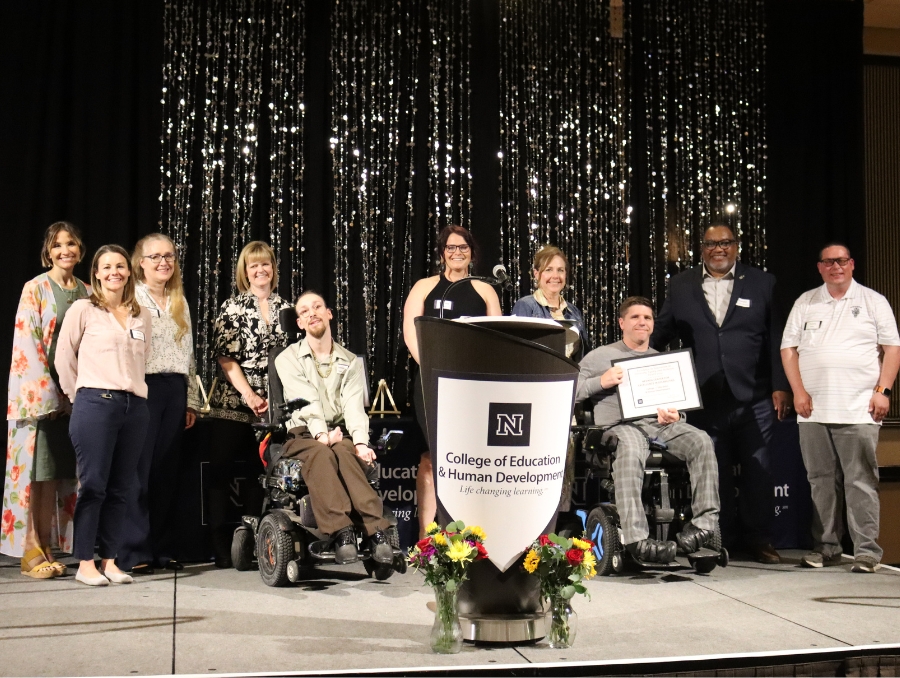Warren St. John liked the room he visited Tuesday night. So much so that he told an audience of more than 200 gathered in the grand ballroom of the Joe Crowley Student Union that the “warmth meter” he felt was strong.
That didn’t stop St. John, author of the 2010 Summer Scholars book project subject, “Outcasts United: An American Town, a Refugee Team, and One Woman’s Quest to Make a Difference,” from reminding those gathered for his 90-minute talk and question-and-answer session that he was the person responsible for the extra work during the summer.
The more than 2,500 members of the University of Nevada, Reno’s Class of 2014 were asked to read “Outcasts” over the summer before participating in discussion groups during orientation activities in late August.
“I promise you I would’ve made (“Outcasts”) one hundred pages shorter … with a lot more pictures,” St. John said with a grin, noting jokingly that he felt a little “guilty” that his 320-page book was the focus of the freshman reading/discussion exercise.
In many ways, though, “Outcasts” was the perfect book for the Class of 2014, which was not only the University’s largest freshman class ever, but was also the most diverse in the institution’s more than 130-year history.
Diversity, community, along with the special connections that can be made by strong-willed individuals who “engage the world around them,” were among several themes that the 41-year-old author and journalist stressed during his presentation.
St. John said the narrative of “Outcasts” was driven by three elements: the Jordanian-born female coach of the refugee youth soccer team, Luma Mufleh; the town where the book took place, Clarkston, Ga.; and the members of the youth soccer team known as the “Fugees.”
“All three are going through extraordinary transitions,” St. John explained, adding that change, whether it was seen in Clarkston coming to grips with a new identity as a refugee center or the young players learning the ins and outs of a confounding American culture, was something he observed on a daily basis as he researched the book.
“It was an environment,” he said, “where everyone was different. Being different became the norm. There was no center for everyone to judge themselves against.”
St. John said he came to the story of the Fugees and Clarkston almost by accident, in a moment of serendipity during a discussion with a stranger in Atlanta. St. John was a writer for The New York Times, and was author of one book, “Rammer Jammer Yellow Hammer,” which chronicled the crazy, obsessive world of University of Alabama football fandom.
During the discussion, which morphed into a meal that evening over a hamburger, St. John learned about international rescue efforts in war-torn nations. St. John was fascinated with what he heard, particularly when he learned about Luma and her soccer team with a roster of players from countries that included Liberia, Sudan, Iraq and Afghanistan.
“I pretty much turned it into a 45-minute interrogation,” St. John said, noting that his reporter’s instinct for a good story had kicked into high gear.
St. John had the next day, a Sunday, off. “For reasons I’m not entirely sure of,” St. John said, he decided to call Coach Luma to see if he could visit with her. Luma invited St. John to the Fugees’ match on Sunday. When he arrived there, St. John was struck by several things. First among them: while the sideline of the Fugees’ opponent was packed with parents, food and equipment, there was no such support system evident on the Fugees’ side.
Other than Coach Luma, there were no Fugees parents to be seen. (The Fugees’ parents, as it turned out, did not have the luxury of attending their children’s matches due to work constraints.)
While Luma remained stoic, arms folded, her American coaching counterpart screamed and yelled.
The contrasts of the match, like the Fugees’ free-flowing , exciting, intuitive brand of soccer, never ceased for St. John that morning.
St. John said it was a “Eureka moment” to realize that, “I’d never stopped to think what it meant for your parents to go and watch your games.”
The Fugees came away with a 9-2 win that day. St. John came away with something more.
“I left completely blown away … and puzzled by what I’d seen,” he said. “This group of 15 boys from throughout the world, from different countries, had come together in a special way. They had responded to this stern, mysterious woman in a way that really impacted me.”
St. John was fairly certain he had the makings of an interesting book on his hands. Just to make sure, however, he emailed a childhood friend, who was then a professor at the University of Minnesota.
St. John’s email described in detail what he had seen.
“I received a one-line response back,” St. John recalled. “It said, ‘If that’s not your next book, then you’re an idiot.’”
St. John said there were many examples from the book that he liked, vignettes that provided vivid illustration of what has happened and continues to happen in Clarkston, and what has happened and continues to happen in the United States – in every instance, immigration, assimilation and the willingness to change serving as clear centerpieces of the American experience.
His favorite example from Clarkston, he said, was that of a store owner, Bill Mehlinger, who came dangerously close to having to shutter his business. Thanks to one of Mehlinger’s employees, a Vietnamese immigrant who suggested Mehlinger acknowledge that Clarkston’s population was becoming more diverse and adjust the store’s inventory accordingly, Mehlinger was able to save his business. Indeed, within three days of shifting Thriftown’s emphasis to a more international clientele and inventory, “the shelves were empty,” St. John said. The refugee community of Clarkston was flocking to one of the few places in the region where their native foodstuffs were available.
Today, Thriftown in Clarkston employs refugees from 30 countries, St. John said.
“I had a difficult time fact-checking the book, because every time I would call Bill Mehlinger, he would say, ‘I can’t talk to you right now because I’m at another refugee wedding,’” St. John said with a laugh. “Bill Mehlinger made a really deep, lasting connection by identifying a common goal with his employees … and real social transformation occurred.”
St. John encouraged Tuesday’s audience to seek the same thing.
For the University’s first-year students, he said, “You’re a group of people from diverse backgrounds, and you’ve all come together in Reno, and it’s sort of up to you how your community will look.
“It’s not very often in life where you get to so completely take control of your surroundings as you do right now.”
As difficult as the lives profiled in “Outcasts” seemed to be, St. John said, ultimately there was much hope and optimism to their stories.
The vast majority of the people of “Outcasts,” whether it was townspeople or young soccer players, “decided they were going to affect their communities,” St. John said. He paused for a moment, perhaps as a way of noting that anything in life worth doing – even it involves a little extra work, like doing some required reading over the summer – is usually worth the effort. “Remarkably,” St. John added, with a hopeful smile, “it seems to me, the people in Clarkston who committed to that succeeded.”










